Quote by Ernest Bevin at the British Parliament during a heated
discussion concerning the Middle East.
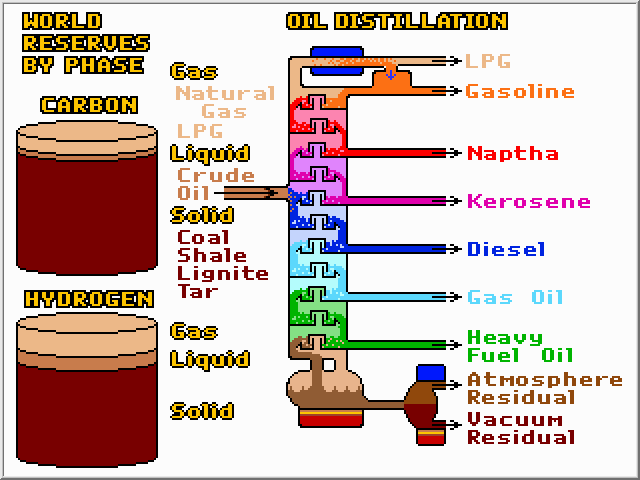
Distillation
Oil contains a complex mixture of hydrocarbons. The first step in
obtaining something of value from this muck is to de-salt and de-water
it. Then the oil is heated and sent into a huge distillation column
operating at atmospheric pressure. Heat is added at the reboiler, and
removed at the condenser, thereby separating the oil into fractions based
upon boiling point. A typical atmospheric column can separate about 4,000
cubic meters (25,000 barrels) of oil per day. The bottom fraction is sent to
another column operating at a pressure of about 75 mm Hg (one tenth of an
atmosphere). This column can separate the heaviest fraction without thermally
degrading (cracking) it. Whereas atmospheric columns are thin at tall, vacuum
columns are thick and short, to minimize pressure fluctuations along
the column. Vacuum columns can be over 40 feet in diameter!
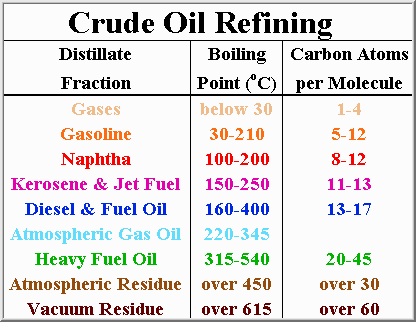
Which Fraction to Make?
Various fractions are more important at different times of
year. During the summer driving months, the public consumes vast
amounts of gasoline, whereas during the winter more fuel oil
is consumed. These demands also vary depending upon whether you live in the
frigid north, or the humid south. Modern refineries are able to
alter the ratios of the different fractions to meet demand,
and maximize profit.
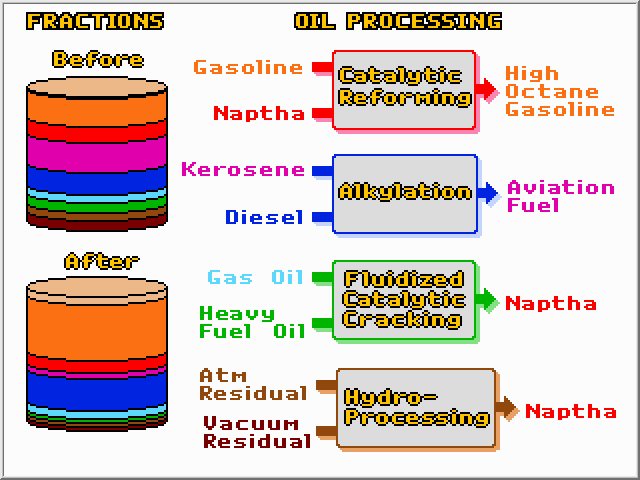
The Five Pillars of Refining
While distillation can separate oil into fractions, chemical reactors
are required to create more of the products that are in high demand.
Refineries rely on four major processing steps to alter the ratios of the
different fractions. They are; Catalytic Reforming, Alkylation,
Catalytic Cracking, and Hydroprocessing. Each of these methods
involves feeding reactants to a reactor where they will be partly
converted into products. The unreacted reactants are then separated from
the products with a distillation column. The unreacted reactants are
recycled for another pass, while the products are further separated and
mixed with existing streams. In this way complete conversion of reactants
can be obtained, even though not all of the reactants are converted on a given
pass through the reactor. The four processing methods, along with
distillation, are the pillars of petroleum refining.
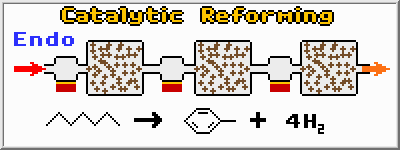
Catalytic Reforming
Catalytic Reforming produces high octane gasoline for today�s
automobiles. Gasoline and naphtha feedstocks are heated to 500 degrees
Celsius and flow through a series of fixed-bed catalytic reactors.
Because the reactions which produce higher octane compounds (aliphatic in this
case) are endothermic (absorb heat) additional heaters are
installed between reactors to keep the reactants at the proper temperature. The
catalyst is a platinum (Pt) metal on an alumina (Al2O3) base. While
catalysts are never consumed in chemical reactions, they can be fouled,
making them less effective over time. The series of reactors used in Catalytic
Reforming are therefore designed to be disconnected, and swiveled out of place,
so the catalyst can be regenerated.
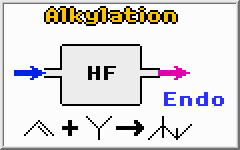
Alkylation
Alkylation is another process for producing high octane gasoline. The
reaction requires an acid catalyst (sulfuric acid, H2SO4 or hydrofluoric
acid, HF) at low temperatures (1-40 degrees Celsius) and low pressures
(1-10 atmospheres). The acid composition is usually kept at about 50% making the
mixture very corrosive.
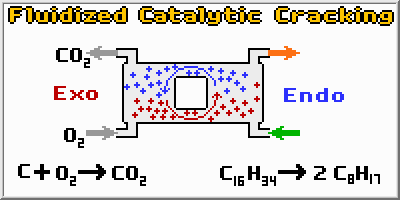
Fluidized Catalytic Cracking
Catalytic Cracking takes long molecules and breaks them into
much smaller molecules. The cracking reaction is very
endothermic, and requires a large amount of heat. Another problem is that
reaction quickly fouls the Silica (SiO2) and alumina (Al2O3) catalyst
by forming coke on its surface. However, by using a fluidized bed to
slowly carry the catalyst upwards, and then sending it to a regenerator
where the coke can be burned off, the catalyst is continuously
regenerated. This system has the additional benefit of using the large
amounts of heat liberated in the exothermic regeneration reaction to heat
the cracking reactor. The FCC system is a brilliant reaction scheme,
which turns two negatives (heating and fouling) into a positive, thereby making
the process extremely economical.
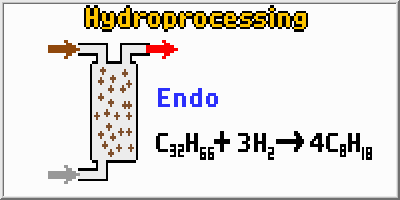
Hydroprocessing
Hydroprocessing includes both hydrocracking and hydrotreating
techniques. Hydrotreating involves the addition of hydrogen atoms to molecules
without actually breaking the molecule into smaller pieces. Hydrotreating
involves temperatures of about 325 degrees Celsius and pressures of
about 50 atmospheres. Many catalysts will work, including; nickel,
palladium, platinum, cobalt, and iron. Hydrocracking breaks longer molecules
into smaller ones. Hydrocracking involves temperatures over 350
degrees Celsius and pressures up to 200 atmospheres. In both cases,
very long residence times (about an hour) are required because of the
slow nature of the reactions.
|

